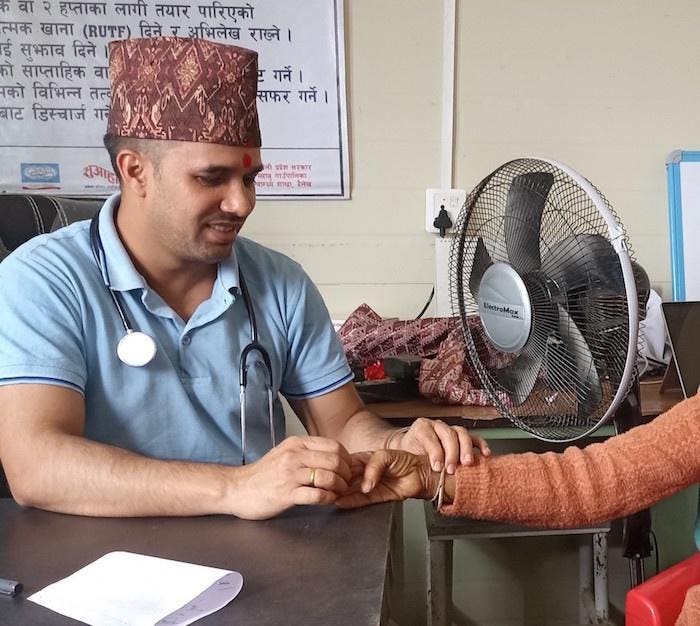UNICEF is collaborating with Eli Lilly and Company and the Kathmandu Institute of Child Health to alleviate the high burden of noncommunicable diseases (NCDs) in Nepal, with a focus on children and adolescents.
DAILEKH, NEPAL: Manju Bishwakarma recalls how, not too long ago, a resident of her village situated in the high hills of western Nepal, within the Dailekh District, died of cardiac arrest. The incident came as a shock to both health workers and locals who had never known the man to suffer any heart issues prior to his sudden death.
This, however, is not the first tragedy of its kind that Bishwakarma, who currently serves as a community medical assistant at the Naumule Primary Health Care Center (PHCC), has come across. According to her, a lot of people suffering from noncommunicable diseases (NCDs), including children and adolescents, are unaware of these conditions until it is far too late.
“On one hand, many choose to ignore their symptoms and don’t go for regular check-ups,” she says. “But, on the other hand, even when they do visit health facilities, like ours, we often don’t have the right equipment or training to give them the help they need.”
Data from the Nepal Burden of Disease 2019 report shows the proportion of deaths due to NCDs rose from 31.3 percent in 1990 to a whopping 71.1 percent in 2019. This includes cardiovascular diseases, chronic respiratory diseases, neoplasms, tuberculosis and intestinal infections caused by viruses, bacteria and parasites, among other illnesses. And while children and adolescents are affected, there are no comprehensive studies or data on the prevalence of NCDs in this age group in Nepal. A prevalence study is currently underway, conducted by UNICEF in collaboration with the Nepal Health Research Council.
The proportion of deaths from NCDs in Nepal shot up from 31.3 percent in 1990 to 71.1 percent in 2019
“NCDs comprise a huge burden in Nepal, including in terms of the treatment costs, lost productivity, reduced quality of life and the deaths they incur,” says Dr. Bhagawan Koirala, chair of the Kathmandu Institute of Child Health (KIOCH).
Koirala explains that aside from poor data on affected children and adolescents, the absence of a structured referral mechanism has been one of the biggest impediments to effective NCD management in Nepal, followed by lack of trained human resources at community and district-level health facilities.
Not only do these factors prevent early detection of illnesses, he says, but it also places unnecessary strain on people’s pockets as well as on the resources of tertiary care institutions, those specialized hospitals that provide advanced medical care and treatment options.
“This has an impact not just on individuals and families,” says Koirala, “but also the health care system and the nation as a whole.”
More training for health professionals and a structured referral system will improve the delivery of NCD services nationwide
To help alleviate this burden and decentralize the delivery of NCD services across the country, UNICEF is collaborating with Eli Lilly and Company and KIOCH to pilot the PEN-Plus integrated care delivery program across four districts in Nepal: Bajhang, Dailekh, Gulmi and Siraha. PEN-Plus addresses severe NCDs like type 1 diabetes, sickle cell disease and rheumatic heart disease, among others. This is designed to complement the WHO PEN (Package of Essential Noncommunicable Disease Interventions), which deals with less severe NCDs like uncomplicated hypertension and type 2 diabetes.
Through the establishment of PEN-Plus clinics at four hospitals in these districts, the project aims to improve the chain of referrals for NCDs across primary, secondary and tertiary care, as well as strengthen overall capacity for screening and treatment, enabling people at risk, including children and adolescents, to be identified and supported in a timely manner.
Dr. Dharma Raj Regmi, medical superintendent at the Dailekh District Hospital/Health Service Office, is excited to establish a PEN-Plus clinic and is looking forward to the impact this will have on the community.
“We face a lot of difficulties in managing NCD cases at the moment because of the lack of systematic referrals and trained personnel,” he says.
“This is especially difficult when we are trying to help people living in remote reaches of the country for whom access to and affordability of specialized health care is already complicated, and who lose a great deal of precious time in getting connected to the right treatment facility.”
The PEN-Plus clinic to be established at the Dailekh District Health Service Office will act as a much-needed referral point from primary health care centers across the district, according to Regmi. “Once they come here from the PHCCs, we can then examine them further and determine the best course of action, whether treatment can take place here or if they need to go elsewhere,” he says.
Bishwarma agrees that having this structure in place will be a big relief. She is also looking forward to building her own skills in NCD care as part of the planned PEN-Plus training packages targeting community health workers. “As the closest and first port of call for community members, we want to be equipped to catch the signs of illness on time and guide people on the next step,” she says.
“As someone who got into the profession to save lives, I am hopeful that the project will help me do this better.”
Learn more about the UNICEF-Lilly collaboration, and about other ways UNICEF partners with companies to increase impact for children globally.
Read the full article here









